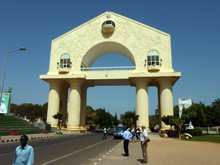NBS Gambia Performs Epic Telling of Mark 14-16
With the ebb and flow familiar to many of us involved with biblical storytelling, it is joyful to report that biblical storytelling is again active in the West African nation of The Gambia. NBS Gambia [Network of Biblical Storytellers of The Gambia] has not only been meeting in 2014 but also organized an epic telling of the passion story according to Mark. The event was held on March 30 and featured about 20 tellers.
Minutes from the planning meeting report considerations that are not present in most American tellings: “It was also agreed that the telling of the passage should be made interesting, snappy and to the point and not overstretched, hence there would be no repetition of the same verses in two or more languages due to time.” For reminders of planning details that storytellers in the States do need to consider, click here and read excerpts from Gambia NBS minutes.
Click here for a full report on the event from Pastor Benjamin Michael NBS Gambia leader.
The Choice
Commentary on Mark 15:6-15 by Dr. Tom Boomershine
Many people conclude that the story of Jesus’ sentencing places the responsibility for his crucifixion on the Jews and excuses the Romans. According to this view, Mark’s intention is to condemn the Jews and to communicate that “they” are responsible for Jesus’ death. This is because most people read the story as silent text and do not experience it as members of an audience hearing it told. But as with all ancient literature, Mark’s Gospel was composed for live performance, not for solitary, silent reading. This difference of communication experience radically impacts meaning.
As a performed story, The Sentencing is structured by the rhetoric of implication rather than the rhetoric of condemnation. The purpose inherent in its structure is to implicate the members of Mark’s audiences in Jesus’ death, rather than to encourage them to condemn others (namely, the Jews). The story-hearing experience of implication in The Sentencing invites reflection on the crowd’s choice of Barabbas over Jesus. At its heart the story invites listeners to turn away from the belief that violence and war will save us from the powers of evil.
Click here to download PDF of one-page commentary on Mark 15:6-15.
Mark’s PDR in Prison
Amelia Boomershine
Conference leadership in prison? No, they didn’t get arrested, tried and sentenced to do time-but West Ohio Annual Conference (United Methodist Church) Bishop Gregory Palmer and his entire cabinet spent most of a day with inmates at Chillicothe Correctional Institution (CCI) in late February. The inmates were all part of a year-long faith and character transformation program called “Horizon Prison Initiative” with which GoTell has been working for a couple of years, so I attended as well. Last Fall I led a biblical storytelling course on Mark 1 at CCI and it was a pleasure to exchange greetings with men who were in that course.
It was also good prep for the course I began teaching soon afterwards: an eight-week series on the passion, death and resurrection of Jesus (PDR), according to Mark. The course will culminate in early May with a 15-part “epic telling” of Mark 14-16. The men are hard at work learning their stories. We will be our own audience, though as always we will invite the Holy Spirit into our midst to enjoy it as well.
Learning Mark’s PDR for this course has been an extraordinary blessing. As I was working on the story of Jesus’ arrest it suddenly hit me that all those I would be teaching the story would have experienced arrest, as Jesus did. They could identify with his experience in a way that most church folk could not. Observing their learning and hearing their connection stories has amazed and inspired me.
We follow a Lord who was arrested, tried, and sentenced like a common criminal. His best friends betrayed him, abandoned him, denied him. His fans (“the crowd”) turned against him with a fateful choice. The passion story has guards, witnesses, charges, prisoners and punishments. These are just a few of the incredible number of connections between the experiences recalled in Mark 14-16 and the experiences of men and women in prison. I anticipate that hearing, learning, and telling to each other the story of Jesus’ resurrection will have a profound impact on all of us this Easter season.



